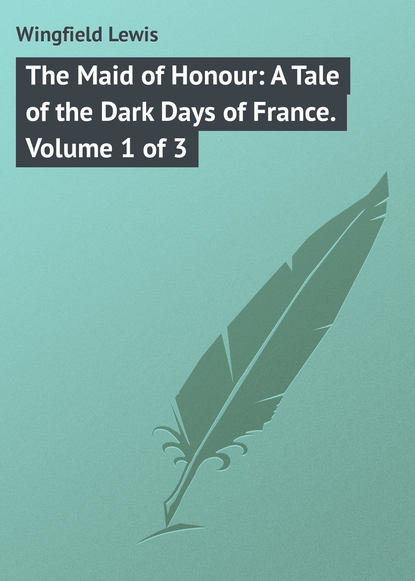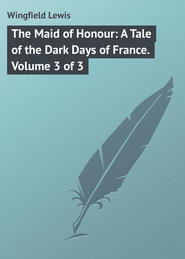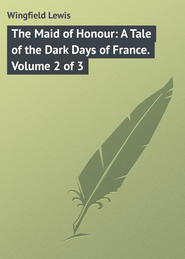По всем вопросам обращайтесь на: info@litportal.ru
(©) 2003-2024.
✖
The Maid of Honour: A Tale of the Dark Days of France. Volume 1 of 3
Настройки чтения
Размер шрифта
Высота строк
Поля
CHAPTER III.
INVESTIGATION
Who was Toinon? A very important personage. Foster-sister and confidential abigail to the Marquise de Gange, the two were as united as if they had indeed been sisters.
Of pretty dark-eyed roguish Toinon, neither the lacqueys, nor pages, nor hairdressers could make anything. When they exposed their flame for her edification she was irreverent enough to laugh. Tapping the swelling bosom, of whose outline she was justly proud, she would declare with a merry peal, that it was an empty casket. The organ which they professed to covet was no longer there, having been surrendered to the safe custody of a certain young man at Lorge. She had left it behind on purpose, lest some of these enterprising kitchen-beaux should steal it unawares. Whereabouts was Lorge, one gibed, that he might run and fetch the treasure?
Lorge, she replied, with mock seriousness, was a gloomy chateau on the Loire, home of rats and bats, of which the less one saw the better. He who would venture thither in search of that missing organ of hers would have to break a lance with Jean Boulot, a stalwart, honest gamekeeper, who would thrust the invader down an oubliette without compunction, to vanish for evermore.
When the worthy maréchal called at the Hotel de Gange, as was his daily wont, and, instead of making at once for his daughter's boudoir, turned aside into the tiny chamber where Toinon sat and worked, that damsel started and turned red. Brought up side by side with Gabrielle, she entertained a deep veneration for the old soldier. For him as for the marquise, she would have worked her fingers to the bone; have cheerfully submitted to any penance; and now her conscience tingled guiltily, for she knew that she deserved a lecture.
Doubtless it had come to the ears of de Brèze that when last the family was at Lorge, she and big Jean Boulot had plighted troth together. The maréchal would, of course, rate her soundly for her folly, since with her advantages she might have done much better than throw herself away upon a peasant.
Jean was a fine fellow, blunt and obstinate, but sincere, given to thinking for himself, but he was only a servant, half-gamekeeper, half-bailiff, and many a well-to-do farmer would have been too glad to place pretty Toinon at the head of his table. This was bad enough; but worse remained behind. Since it had been imprudently encouraged by the king, that plaguy Third Estate had been giving itself airs, flaunting its arrogant pretensions and propounding its ridiculous demands from every country cabaret. The absurd ant stood erect upon its hill with threatening mandibles. Mere yokels were presuming to chatter in village market-places, to discuss matters which concerned their betters, to express opinions of their own which were sadly lacking in respect; and somehow they escaped the lash. Such impudence caused proper-minded and cultured persons to shiver in dismay. If we turn swine into lap-dogs, we shall certainly regret our foolishness. The old maréchal, who hated Lorge, detested it more than ever, when he found that the evil leaven had penetrated into far Touraine, and was not slow in expressing his views with regard to the ant upon the hill. "Life is a game of give and take," he said, "in which the unscrupulous always take too much, unless kept well in hand. Peasants should have no individual opinions, but humbly follow their masters."
Now, was it not a shocking thing that Jean Boulot, who ought to have meekly bowed his head at the very mention of aristocracy, should be insolent enough to make rude remarks about the upper class under the shadow of ancestral Lorge? It was reported to the maréchal that his paid servant had harangued his cronies under the village tree, and had used pestilent expressions anent the local magnates. He received prompt warning that on a repetition of the offence he would lose his place, whereupon he was said to have remarked, with a broad grin, that soon there would be no place to lose. And Toinon, foster-sister and confidential abigail, had absolutely betrothed herself in secret to this abandoned wretch!
It was awful; but when we give ourselves away, how shall we recover the gift? She determined to bring her lover to a proper frame of mind before confessing what she had done. She wrote commenting sharply on the escapade, imploring her betrothed to reform, lest haply he should share the gruesome fate which she was informed awaited democrats. To this he had replied in an independent and flippant manner, which foreshadowed a thorny future. "My darling," he had the assurance to write, "never fear for me. If all masters were like ours, instead of being selfish tyrants, we should all be peaceable and happy; but, alas, the innocent minority must, for the general good, submit to suffer for the guilty. France, asleep too long, is slowly waking. National sovereignty, spell-bound for centuries, has yawned and stretched itself, and fools would oppose, to combat the champions of Liberty, the flickering will of a weak king! War, my dearest, it will have to be, for we must wade to the goal through blood. God gives justice to men only at the price of battles!"
A nice sort of letter, this, for one who was almost a de Brèze to receive from her affianced husband! How quickly she destroyed the tell-tale scrap which she had hoped to be able to exhibit. These high-flown periods were not his own. With rough and homely fist he had copied this pinchbeck fervour. He must have taken to frequenting one of those horrid, odious clubs that were springing up like fungi, be consorting with abominable demagogues. There were some firebrands about who were beginning to be known as Jacobins. Surely honest Jean would never become so depraved as to join that cohort? Would it be wise as well as loyal to send this lover packing-to disclaim at once both him and his pestilent opinions? No doubt it would, but in love matters who is wise? Toinon loved her big, blunt, honest Jean, and if he adored his darling as he delightfully vowed he did, it was her place to exert her influence to bring him to a better mind. On the very next visit to Lorge, she would rate him soundly, drag him by force out of the mire, cleanse his soiled wool, and produce in triumph the errant sheep clean and quite respectable.
But if the maréchal knew all about it, and was here now to administer a jobation, what course should she pursue? It was a feeling of guilt and a resolve to fight that brought the becoming flush to Toinon's cheek.
It was not, however, to denounce an undeserving swain who was a democrat that the maréchal strode into her room, and hearkening to his discourse she felt relieved. After listening to the tale of his suspicions the girl sat pondering with her work upon her lap gazing idly at a long string of gilt sedans that were crawling in the direction of the Tuileries. The marquis unkind to his wife? Yes and no. He was a singular man, the marquis, made up, more than most, of contradictory and opposing elements. He was apparently self-contained, complete in himself, needing no sympathetic help; and yet he was a weak and undecided man, and these require support. To Toinon he was a riddle, for it had struck her once or twice that the passions of which he seemed to be bereft might be only dormant; that the crust in which he was enveloped might need but a touch for him to burst his cerements, and show that he was a mortal after all. Was he deceitful-playing a part for a deliberate purpose? No. Toinon thought not; there was no motive for comedy. What she did feel certain of was this. If he was in a trance, as she half suspected, it must be by some other hand than Gabrielle's that he would eventually be aroused. He was an instrument which she had not the skill to play upon. Had not the faithful abigail watched the pair for years? As month followed month they had drifted further asunder and were still drifting. The estrangement to the wife was torture; the husband it affected not. In her pain she lowered herself to "scenes" – exhaled herself in wearisome complaints.
The Maréchal de Brèze was shocked and distressed. Torture, scenes, complaints! And he had been thanking heaven that there was no blur on the mirror of their happiness. He would take his son-in-law to task; pour out upon him the appalling vials of his indignation; bring him to his knees repentant. Toinon sagely shook her head. "Place not the finger twixt bark and tree," dryly observed the sapient maiden. "The paled ashes of affection may not be made to glow again by scoldings. She is an angel-the best of women-but too apt sometimes to figure as a femme incomprise. All may come right in time, for he is a well-meaning man if difficult to live with." Then Toinon travelled off on the sea of conjecture. Was he a good man or not? "Upon my word," she declared at last, "after six years of watching I cannot tell what he is. A colourless nonentity? I can hardly think so. There are people with whom we have been in close communion half our lives, and whom we believe we know down to the finger-tips. Then, hey! Presto! They suddenly do something unexpected, and we find that we never knew them at all!"
"But with such a wife as Gabrielle," urged the maréchal, chafing. "Young, pure, sweet, rich, beautiful. Gracious powers! Was the man marble? What more could mortal require?"
Toinon, except in her own love affairs, could be vastly wise. "Alas, dear master," she said, laughing sadly, "sure you have learned by this time that to some perfection is intolerable? Are we not often impelled, being so imperfect ourselves, to love people for their defects? On account of alluring blemishes we agree to overlook their virtues. You must have known men, chained for life to loveliness, who have adored a freckled fright, and gloated in the joy of contrast over the details of her ugliness."
The old soldier looked glumly out of window, silent, whereupon the damsel continued.
"Of all the stupid old legends, Beauty and the Beast is the silliest. Why. Many a charming woman would have been disgusted when the hideous wretch turned out a handsome prince. What is at the bottom of mésalliances? Why do cultivated women elope with ignorant domestics; leave home and comfort to consort with a lacquey or a groom? Because to some there is a charm in stooping. The act of uncrowning is in itself a pleasure. Perhaps madame is too perfect for the marquis."
The maréchal admitted, by silence, the truth of the shrewd damsel's discourse. In his own time he had had a wide experience, grave and gay, and was not unaware that a jaded or unhealthy appetite craves for abnormal food. None knew better than he that the insipidity of doll-like prettiness may grow exasperating. We gaze at portraits of the celebrated fair ones of the past, and scanning their queer mouths and noses, conclude that fashions change in beauty as well as costume. We fail to detect the charms of Anne Bullen or Mary Stuart, and we are wrong. Intellect and wit can illumine irregular features as the sun lights up a landscape. Thick lips and a snub nose may be transfigured under the divine rays till they seem a miracle of loveliness.
Then the anxious old gentleman waxed cross. A froward girl was Toinon with her sham sagacity. She had ridden away on a false premise. The most plausible theories are delusive. Gabrielle was no doll, but a quiet, well-conducted, sensible woman enough, if not of brilliant parts. Femme incomprise, indeed! Modest but fragrant violets lurk under leaves, and we take the trouble to look for them. How dared this presumptuous marquis to misunderstand the treasure he had won? It was not the comely mask of flesh alone that drew the buzzing crowd of moths. Married, they could not be aiming at her wealth. The marquise was constantly surrounded by the attentive bevy of youths. Butterflies attended her daily lévée, drank chocolate while her hair was being powdered, spent hours over her trivial errands, and she accorded to none the preference. A virtuous wife in an unvirtuous throng might be of momentary interest as an anomaly, but sparks would soon weary of the wonder. No. She was lively enough to hold her own in the swift patter of petty small-talk. It did the heart good to hear her jocund laugh. It must be admitted that the expression of her face changed little, but then it was so fair that to change would be to mar it. Who would have the sculptured Psyche grin, or ask the Venus of Milo to grimace?
The more carefully he reviewed this knotty question, the more bewildered became the excellent de Brèze. Laudably resolved to delve to the bottom, he left the waiting-maid for the mistress, and observed for the first time that his daughter's welcoming smile was less bright than of yore. On being cross-questioned, she grew grave and reticent, refusing to complain of her husband, and entrenched herself within a proud reserve. "He might be odd, but she preferred him as he was," she declared shortly; would not have him altered by one tittle. Vainly her father pressed her, assured her that he would do nothing that she would not entirely approve. There was naught to be drawn from Gabrielle.
"Well," said the maréchal at last, wistfully sighing, "if I am not to interfere, I won't; but you know that I live only for my child."
"I know you do, dear," she softly answered. "Your anxiety wrings my heart!"
Then rising from her seat, trembling from head to foot, she clasped him in a fond embrace, and seemed about to make a confession. Words trembled on her lips, but whatever they were, she choked them back again, and indulged in delicious tears.
"You have spoilt me so, that I am naughty and capricious," she remarked gaily. "Do you really sufficiently love your little Gabrielle to submit to a wayward whim?"
"When did I deny you anything?" reproachfully replied de Brèze.
"Never; nor will you now, though it is a great slice of property that I require. Will the best of men humour my new fancy? Yes? Well, then, know that I am tired of Paris and its tinsel, and would fain retire to the country."
"You-leave the gaieties of Paris?"
"Yes. The good air and quiet will brace my nerves, untuned by racket, and that explosion of presumptuous wickedness that sacrificed so many lives."
"The storming of the Bastile?" returned the maréchal. "Pshaw! By and bye we will terribly avenge de Launay and his intrepid garrison. What on earth will you do in the country? In a week you'll be petrified with ennui."
"Not at Lorge. Its grimness suits my humour. The children are less strong than I would have them. Freedom in pure air will bring back the roses to their cheeks, and in them you know I am engrossed. My children, oh! my children! What should I have become without them."
The involuntary bitter cry, so eloquent of pain, and so speedily suppressed, clove the bosom of the maréchal.
"She will not tell me or have confidence," he groaned inwardly, "and yet her suffering is great. She must have her way in this as in other things, and God be with her in her travail."
With the delicate tact of a gentleman he let pass the cry unnoticed, and simply said, "What do you wish, my dearest?"
"Lorge," she replied, "no less. What a rapacious greedy soul I must be to rob you of the home of your ancestors!"
"It shall be yours," the maréchal replied, delighted to be able to do something. "I understand that for some reason you desire to take possession and hold the place without interference? Is that so? At my death, it will be yours with all the rest. Meanwhile, I lend it, to do with as you will."
It was an odd fancy. What could be the meaning of the freak? Presently he enquired, "What will your husband do?"
"It was his idea," was the eager rejoinder. "He wishes it, and I am-oh-so very glad! I long to get him away from Paris and its evil influences. Do you know, father?" Gabrielle continued in a grave whisper, "that there are secret meetings he attends, to come home at dawn in a fever. And there are forbidding men who come to see him, whom he evidently does not want to see; such coarse and common men. I don't know what it all is, but it has something to do with that mystical groping after the unattainable which is so weariful, and can only end in madness. To a Christian, such impious presumption is horrible!"
"Then I hold the clue?" cried the old man, much relieved. "It is the prophet who is in your way? You would wean Clovis from Mesmer, turn him from Cagliostro, and carry him to Mass on Sundays?"
The idea was so comically innocent, that de Brèze wheezed with delight. "Sweet pet!" he said, tapping his daughter's cheek archly, "you are earnest if not clever."
And then he went off into a shout of laughter, as he beheld in imagination the daily scene at Lorge. Tête-à-tête in the dreary chateau among the bats and owls, she would drone out Bossuet's sermons to put animal magnetism to flight; perhaps call in the village curé to assist. What a delightful prospect for the husband! How ghastly tiresome is the wife who preaches at her other half; drones out to him scraps out of good books. Well, well. We must not place our finger twixt bark and tree; but if any form of desperation was likely to awake the entranced Clovis (as Toinon had it), a system of moral lecturing on the part of a well-meaning but narrow-minded spouse was about the thing to perform the miracle.
The maréchal trotted home quite pleased, and straightway informed by letter those whom it concerned that henceforth, the Marquise de Gange was to be considered the proprietress of Lorge. Both M. and Madame de Brèze equally loathed the place. If Gabrielle was possessed by the strange fancy of playing chatelaine, in its cobwebbed corridors, let her do so by all means, and convert her husband if she might.
The good maréchal was mistaken. Gabrielle knew better than to worry her husband with importunate readings, but trusted rather for the working of a change to the renewed intimacy which retirement must produce. She never would have dared to propose a hermitage to Clovis, but when he himself suggested a temporary flitting, she thanked heaven as if a prayer had been answered. She could not guess that he was afraid to stop in Paris, and that he was revolving an embryo scheme of closer union with Mesmer. The prophet having been ejected from the land with Maranatha, could not unfortunately bestow his presence or personal assistance. But why should he not send to his pupil some learned adept, well versed in mystic lore who, in sylvan solitude would further instruct the neophyte? Removed from the frivolous court, and secure against being mixed in the treasonable doings of political philanthropists, his mind would be in a condition of receptivity, and his studies would make giant strides.
Poor Gabrielle! She had said to herself with a choking heart-leap that, removed from pernicious influences, she and the cherubs would wind fond webs about him, and win him from indifference to love. Alas! Poor simple yearning wife!
CHAPTER IV.
THE CHATEAU OF "LORGE."
In Touraine, midway between Tours and Blois, the venerable chateau of Lorge stands out from a wooded background, bathing its feet in the swiftly flowing Loire, morosely contemplating the details of its grim reflection. Profoundly interesting from an archæological point of view, the historic pile is not a lively dwelling, and it is no wonder that the jolly old maréchal should have ungrudgingly passed it to his daughter. Privileged to occupy a place in one of the most smiling provinces of France, it is within a drive of Amboise on one side and Chinon on the other, dignified castles both; and not very far away is Diane de Poictier's Chenonceaux, whimsically spanning a river, a specimen of elfin architecture straight from fairyland. Lorge dates from the iron period; not the time of prehistoric man, who had recently blossomed out of monkeydom, but of the early mediæval barons, who slept in their armour-as they still do on their tombs-whose pet pastimes were the cleaving of pates and the quaffing of usquebaugh.
With the march of centuries Amboise, Chinon, and the rest found it advisable to polish themselves up, and modify their native harshness to be in touch with less rugged epochs; but no coaxing ingenuity of architect or landscape gardener could ever smooth the frown from the frowning face of Lorge. It seemed to say with pride, "The darkest and most cruel deeds have been perpetrated within my walls. Down below I have smothered the cries for mercy of weak women outraged, and children brutally maltreated. My favourite music is the clank of steel. I was baptised with blood, whose reek may never fade, whose stain may never be effaced."
You cannot make a junketting house out of a fortress, and Lorge, despite changes, is a fortress still. On the façade, defended by the river, are the stately reception rooms, opening one into the other in a string; a long suite which occupies the first floor, whose heavily mullioned casements are large enough to permit the sun to gild the antique hangings. Each of these windows is adorned by a ponderous stone balcony, which can be used for purposes of defence. The other sides of the edifice seem blank and blind, the high enclosing walls being unbroken, save by a dentilated series of merlons and crenels, with cruciform embrasures below, The chambers on these sides are particularly depressing to the spirits, since they afford no prospect, save a bare paved court with the enclosing wall beyond.
Courageous chatelaines, striving after cheerfulness, have made efforts from time to time to brighten Lorge. The drawbridge and portcullis, which jealously barred the entrance, have been removed from the double archway and replaced by wooden doors. The moat which guarded the three sides landward, with a defensive wall along the outer bank, has become a garden with trim green slopes, and a wealth of glorious roses. The ends that used to join the river have been walled up, and adorned with flights of steps which lead to decaying boat-houses. Private posterns, drilled in the masonry, afford easy access from the courtyard to the moat-pleasaunce for such as may possess the keys; but in spite of every effort, the flowering hedges and rose-bushes only serve by contrast to make Lorge more dreary-a skull bedecked with flowers. One specially brave lady had the hardihood once to plan great gardens in the Dutch style beyond the moat, on the other side of the road. There were long alleys of clipped yew and beech; tonelles or arched bowers to give grateful shade; a procession of weird animals, fashioned of holly, that cast fantastic shadows on the sward; oblong tanks where swans serenely sailed, steering among isles of water-lily. But no subsequent chatelaine was sturdy enough to carry on the hopeless war. The alleys were soon choked, the tonelles grew into thickets, the mimic menagerie degenerated into ragged rows of bushes. By the time the maréchal inherited, there was no place devoted to flowers except the moat-pleasaunce, and even that was sadly neglected.










